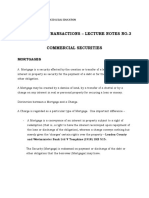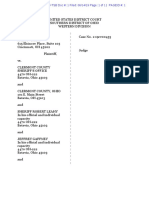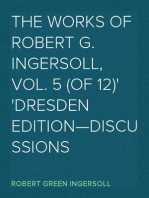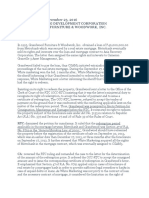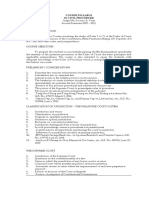Money Judgement
Money Judgement
Uploaded by
Joel BurgessCopyright:
Available Formats
Money Judgement
Money Judgement
Uploaded by
Joel BurgessOriginal Description:
Copyright
Available Formats
Share this document
Did you find this document useful?
Is this content inappropriate?
Copyright:
Available Formats
Money Judgement
Money Judgement
Uploaded by
Joel BurgessCopyright:
Available Formats
IN THE UNITED STATES DISTRICT COURT
FOR THE WESTERN DISTRICT OF NORTH CAROLINA
ASHEVILLE DIVISION
DOCKET NO. 1:22-CR-00016-MR-WCM
UNITED STATES OF AMERICA )
) MOTION FOR
v. ) MONEY JUDGMENT
)
SHAWN THOMAS JOHNSON )
NOW COMES the United States of America, by and through Dena J. King,
United States Attorney for the Western District of North Carolina, pursuant to Fed.
R. Crim. P. 32.2(b), 18 U.S.C. § 982(a)(2), and 21 U.S.C. § 853(p), and respectfully
requests that the Court enter a $3,500,000.00 forfeiture money judgment against
Defendant. Defendant agreed in his Factual Basis (Doc. 4 at ⁋ 6) that he obtained
$3.5 million from the fraud. Thus, based upon the record, Section 982(a)(2), the
substitute property provisions of 21 U.S.C. § 853(p), and Fed. R. Crim. P. 32.2(b),
this Court should issue a money judgment in the amount of $3,500,000.00.
I. BACKGROUND
Defendant pled guilty via Plea Agreement (Doc. 3) to a Bill of Information
(Doc. 1) charging him with bank fraud. Specifically, as set forth in the Factual
Basis signed by Defendant and elaborated upon in the sentencing materials,
Case 1:22-cr-00016-MR-WCM Document 22 Filed 07/19/22 Page 1 of 7
beginning in 2012, Defendant and other individuals acting at his direction
fraudulently obtained millions of dollars in loans to purchase properties that
Defendant effectively owned, managed, and rented through various nominees and
companies. See Factual Basis (Doc. 4 at ⁋ 4). Through this scheme, Defendant
“and his co-conspirators closed on at least sixteen loans from financial institutions,
totaling over $3.5 million, to purchase real estate.” Id. at ⁋ 6. “Once acquired,
[Defendant] used these properties to generate income as short-term rentals.” Id. In
order to illustrate the scheme, the Factual Basis identifies the specifics of the
transactions to purchase some of the properties. Id. at ⁋⁋ 2, 8-19.
The properties that Defendant purchased via the fraud were, as noted above,
often purchased via nominees and have all been refinanced and/or tied-up in
foreclosure and/or bankruptcy proceedings. Although the Government has
attempted to settle with Defendant on forfeiture of alternative properties and/or an
alternative financial penalty, Defendant has not agreed to the Government’s
settlement offers. Nonetheless, this is precisely the type of case in which
punishment in the form of a financial penalty is imperative. Therefore, the
Government now requests a forfeiture money judgment justified by the Factual Basis
and sentencing record.
Case 1:22-cr-00016-MR-WCM Document 22 Filed 07/19/22 Page 2 of 7
II. MEMORANDUM OF LAW
A. Overview of the law authorizing forfeiture
Any person who is convicted of violating the bank fraud statute shall forfeit
to the United States any property which constitutes or is derived from gross proceeds
traceable to such violation. 18 U.S.C. § 982(a)(2)(A); United States v. Holzendorf,
576 Fed. Appx. 932, 937-38 (11th Cir. 2014) (gross bank fraud proceeds subject to
forfeiture); United States v. Peters, 732 F.3d 93, 101-102 (2d Cir. 2013) (proceeds
means receipts and not profits; forfeiture of loan proceeds obtained directly and
indirectly is appropriate); United States v. Newman, 659 F.3d 1235, 1244 (9th Cir.
2011) (“‘[P]roceeds’ of a fraudulently obtained loan equal the amount of the loan.”);
United States v. Boulware, 384 F.3d 794, 813 (9th Cir. 2004) (defendant not entitled
to set-off for loan proceeds that he repaid); United States v. Farkas, 2011 WL
5101752, **4-5 (E.D. Va. Oct. 26, 2011) (same), affirmed, 474 Fed. Appx. 349 (4th
Cir. 2012).
The Government’s burden of proof on forfeiture is preponderance of the
evidence. United States v. Cherry, 330 F.3d 658, 669 (4th Cir. 2003); United States
v. Tanner, 61 F.3d 231, 233 (4th Cir. 1995). The Court’s “determination may be
based on evidence already in the record, including [ . . . ] any additional evidence or
information submitted by the parties and accepted by the court as relevant and
Case 1:22-cr-00016-MR-WCM Document 22 Filed 07/19/22 Page 3 of 7
reliable.” Fed. R. Crim. P. 32.2(b)(1)(B); see also United States v. Farkas, 474 Fed.
Appx. 349, 360 (4th Cir. 2013) (court may rely on trial record to determine
forfeiture). The Government may satisfy the preponderance burden by both direct
and circumstantial evidence. United States v. St. Pierre, 484 F.3d 75, 86 (1st Cir.
2007).
As to money judgments specifically, Fed. R. Crim. P. 32.2(b)(1)(A) and 21
U.S.C. § 853 support imposition of a money judgment when the Court finds the
amount of money that a Defendant will be ordered to pay 1 and when directly
forfeitable assets have been rendered unavailable.2 Fed. R. Crim. P. 32.2; see also
21 U.S.C. § 853; United States v. Chamberlain, 868 F.3d 290, 296 (4th Cir. 2017)
1
Since a money judgment is only collectible via the forfeiture laws, and is not a
traditional judgment in the sense that it is not collectible via the Federal Debt
Collection Act, a money judgment is essentially a placeholder as to the maximum
amount of substitute property that the Government may forfeit from a Defendant
who has otherwise rendered forfeitable property out of reach.
2
The substitute property provisions apply if, as a result of any act or omission of
defendant, the otherwise forfeitable property cannot be located upon the exercise of
due diligence; has been transferred or sold to, or deposited with, a third party; has
been placed beyond the jurisdiction of the court; has been substantially diminished
in value; or has been commingled with other property which cannot be divided
without difficulty. 21 U.S.C. § 853(p)(1)-(2). In a case such as this, in which
property was purchased in nominee names, refinanced, and placed in complex
judicial proceedings tied to foreclosure and bankruptcy, these substitute property
provisions are satisfied.
4
Case 1:22-cr-00016-MR-WCM Document 22 Filed 07/19/22 Page 4 of 7
(in opinion disallowing pretrial restraint of substitute assets, discussing issuance of
money judgments in Fourth Circuit), citing, United States v. McHan, 345 F.3d 262,
272 (4th Cir. 2003). Rule 32.2 provides in pertinent part as follows: “[i]f the
government seeks a personal money judgment, the court must determine the amount
of money that the defendant will be ordered to pay.” Fed. R. Crim. P.
32.2(b)(1)(A); see also United States v. Butler, 578 Fed. Appx. 178, 182 (4th Cir.
2014) (district court must find nexus between forfeiture calculation and crime).
Although money judgment liability is limited to tainted property that a
defendant acquired and such liability cannot be imposed on a defendant for property
solely acquired by a co-conspirator and not defendant, courts have construed the
liability imposed on an individual defendant to extend to liability for property that
defendant obtained via entities or accounts which he controlled. Saccoccia v.
United States, 955 F.3d 171, 175 (1st Cir. 2020) (collecting some cases on receipt
of proceeds through entities and accounts that defendant owned, operated, or
controlled); see United States v. Carpenter, 941 F.3d 1, 9 n.6 (1st Cir. 2019)
(focusing the post-Honeycutt money judgment analysis of a provision of Section 981
on the word, “acquire”; reasoning that defendant liable for proceeds under his
control at some point); United States v. Jergensen, 797 Fed. Appx. 4, 8 (2d Cir.
2019) (each defendant liable for transfer that he approved); United States v.
Case 1:22-cr-00016-MR-WCM Document 22 Filed 07/19/22 Page 5 of 7
Bergstein, 788 Fed. Appx. 742, 748 (2d Cir. 2019) (defendant liable for proceeds
that he controlled); United States v. Chittenden, 896 F.3d 633, 638-39 (4th Cir. 2018)
(forfeiture limited to property that defendant acquired).
As set forth above, the law authorizes forfeiture of gross proceeds of bank
fraud in this case, and Defendant controlled the conspiracy, its entities that acquired
real estate with the proceeds, and the real estate itself. So, gross proceeds are the
“amount of money that the defendant will be ordered to pay.”
B. The money judgment amount in this case
In this case, the Government has limited its request to a conservative
calculation of a money judgment equivalent to only the amount of fraud proceeds to
which Defendant stipulated in the Factual Basis—proceeds which, by virtue of how
Defendant coordinated the scheme and controlled the real estate, he directly or
indirectly received. And, as the sentencing record will reflect and the Government
anticipates that Defendant will agree, all of the properties actually purchased with
the fraud proceeds have been rendered essentially out of reach by additional loans
and refinancing, foreclosure actions, bankruptcy actions, and straw owners created
and/or recruited by Defendant.
Under such circumstances, based on the record, and based on Section
982(a)(2), the substitute property provisions of 21 U.S.C. § 853(p), and Rule
Case 1:22-cr-00016-MR-WCM Document 22 Filed 07/19/22 Page 6 of 7
32.2(b)(1)(A), this Court should issue the money judgment for the fraud proceeds.
See United States v. Blackman, 746 F.3d 137, 143-44 (4th Cir. 2014) (discussing
that fact “that defendant is indigent or otherwise lacks adequate assets to satisfy a
judgment does not operate to frustrate entry of a forfeiture order” since forfeiture is
calculated based on total proceeds of crime, not percentage remaining in defendant’s
possession).
III. CONCLUSION
WHEREFORE, the Government respectfully requests that this Court issue, in
the form submitted herewith, a $3,500,000.00 Money Judgment.
Respectfully submitted, this the 19th day of July, 2022.
DENA J. KING
UNITED STATES ATTORNEY
s/ Benjamin Bain-Creed
Florida Bar # 0021436
Assistant United States Attorney
Suite 1650, Carillon Building
227 West Trade Street
Charlotte, North Carolina 28202
Telephone: (704) 344-6222
Fax: (704) 344-6629
Email: benjamin.bain-creed@usdoj.gov
Case 1:22-cr-00016-MR-WCM Document 22 Filed 07/19/22 Page 7 of 7
You might also like
- Jacob Biddix Wrongful Death ComplaintDocument15 pagesJacob Biddix Wrongful Death ComplaintJoel Burgess100% (1)
- Court PaperworkDocument107 pagesCourt Paperworkgoogleanalyticswgme.com100% (1)
- Agency Bar Exam QuestionsDocument6 pagesAgency Bar Exam QuestionsColee Stifler100% (1)
- Dec. 22 2021 Hardtke Vs EGF ComplaintDocument8 pagesDec. 22 2021 Hardtke Vs EGF ComplaintJoe BowenNo ratings yet
- Gti FraudDocument70 pagesGti FraudHarmonized DraftNo ratings yet
- Kelly Makras IndictmentDocument16 pagesKelly Makras IndictmentJoe EskenaziNo ratings yet
- Kelli Prather ComplaintDocument16 pagesKelli Prather ComplaintSherry Turco CoolidgeNo ratings yet
- Plaintiff's Objection To Defendant's Motion To Dismiss With PredjudiceDocument13 pagesPlaintiff's Objection To Defendant's Motion To Dismiss With PredjudiceEd FurlongNo ratings yet
- Michael and Julie Mardock v. Michael and Virginia McClaughryDocument17 pagesMichael and Julie Mardock v. Michael and Virginia McClaughryThe Department of Official InformationNo ratings yet
- Officer Misconduct Agreement 2020Document8 pagesOfficer Misconduct Agreement 2020Joel BurgessNo ratings yet
- (G.R. No. 143958. July 11, 2003) ALFRED FRITZ FRENZEL, Petitioner, v. EDERLINA P. CATITO, RespondentDocument47 pages(G.R. No. 143958. July 11, 2003) ALFRED FRITZ FRENZEL, Petitioner, v. EDERLINA P. CATITO, RespondentJoseph Santos GacayanNo ratings yet
- Motion To StrikeDocument8 pagesMotion To Strikeanon_410533234No ratings yet
- de Barreto V VillanuevaDocument1 pagede Barreto V VillanuevaAyra CadigalNo ratings yet
- Ziale Lecture Notes On Mortgages, Debentures and GuaranteesDocument37 pagesZiale Lecture Notes On Mortgages, Debentures and GuaranteesMoses Bwalya Mweene100% (5)
- Petition for Certiorari: Denied Without Opinion Patent Case 93-1413From EverandPetition for Certiorari: Denied Without Opinion Patent Case 93-1413No ratings yet
- Petition for Certiorari – Patent Case 94-782 - Federal Rule of Civil Procedure 12(h)(3) - Patent Statute 35 USC 261 – Judgment lien Statute 12 USC 1963From EverandPetition for Certiorari – Patent Case 94-782 - Federal Rule of Civil Procedure 12(h)(3) - Patent Statute 35 USC 261 – Judgment lien Statute 12 USC 1963Rating: 5 out of 5 stars5/5 (2)
- Ag ComplaintDocument59 pagesAg ComplaintForeclosure FraudNo ratings yet
- Redacted Discovery 3 - SM382036 Michael ZelenyDocument61 pagesRedacted Discovery 3 - SM382036 Michael ZelenyZelenyNo ratings yet
- Mers Motion To DismissDocument62 pagesMers Motion To DismissForeclosure FraudNo ratings yet
- 2021-01-02 Petition For Redress of Grievance To Sen. Leader Mitch McConnell - FinalDocument3 pages2021-01-02 Petition For Redress of Grievance To Sen. Leader Mitch McConnell - FinalJoe DettelisNo ratings yet
- Doug Hargrave Fraud Charge InformationDocument8 pagesDoug Hargrave Fraud Charge InformationA.W. CarrosNo ratings yet
- Defendants' Notice of Filing Letter To Bank of America 2013-CA-00115Document57 pagesDefendants' Notice of Filing Letter To Bank of America 2013-CA-00115Neil GillespieNo ratings yet
- Cover Letter and Brief To Court For Foreclosure Defense 8-16-11Document3 pagesCover Letter and Brief To Court For Foreclosure Defense 8-16-11jack1929No ratings yet
- Wells ComplaintDocument22 pagesWells ComplaintForeclosure Fraud100% (4)
- Memorandum in Support of Defendants Motion For Stay ofDocument43 pagesMemorandum in Support of Defendants Motion For Stay ofJohn ReedNo ratings yet
- Mortgage Fraud PresentationDocument5 pagesMortgage Fraud Presentation92589258No ratings yet
- Jeff Sessions Criminal Complaint - Perjury, False Statements, Cover Up, Obstruction of JusticeDocument15 pagesJeff Sessions Criminal Complaint - Perjury, False Statements, Cover Up, Obstruction of JusticeJ. Whitfield Larrabee100% (2)
- Transicript of Bexar County Hearing With Judge Michael MeryDocument41 pagesTransicript of Bexar County Hearing With Judge Michael MeryBexarCo100% (1)
- SB 1890Document28 pagesSB 1890Foreclosure Fraud100% (1)
- Misprision of Felony 18 USC 4 - Title 18 Crimes and Criminal Procedure United States Code - United States Courts - Federal Law - Criminal Statutes - California Federal Criminal Law - US Attorney General - United States District Court - 9th Circuit Court of Appeals - US Attorney CaliforniaDocument1 pageMisprision of Felony 18 USC 4 - Title 18 Crimes and Criminal Procedure United States Code - United States Courts - Federal Law - Criminal Statutes - California Federal Criminal Law - US Attorney General - United States District Court - 9th Circuit Court of Appeals - US Attorney CaliforniaCalifornia Judicial Branch News Service - Investigative Reporting Source Material & Story IdeasNo ratings yet
- Criminal Complaint Against Jamie MooreDocument12 pagesCriminal Complaint Against Jamie MooreSarah Vasile0% (1)
- SEC 342 Status Report June 2022Document16 pagesSEC 342 Status Report June 2022the kingfishNo ratings yet
- Human Rights AlertDocument3 pagesHuman Rights AlertHuman Rights Alert - NGO (RA)No ratings yet
- LIBERI V TAITZ (C.D. CA) - 311.0 - OPPOSITION To MOTION To Dismiss Case Pursuant To FRCP 12 (B) (6) - Gov - Uscourts.cacd.497989.311.0Document7 pagesLIBERI V TAITZ (C.D. CA) - 311.0 - OPPOSITION To MOTION To Dismiss Case Pursuant To FRCP 12 (B) (6) - Gov - Uscourts.cacd.497989.311.0Jack RyanNo ratings yet
- Plaintiffs First Amended Complaint, Gillespie V Barker, Rodems, Cook, 05-CA-7205, May 5, 2010Document151 pagesPlaintiffs First Amended Complaint, Gillespie V Barker, Rodems, Cook, 05-CA-7205, May 5, 2010Neil GillespieNo ratings yet
- Excessive Force Lawsuit Against Clermont County Sheriff's OfficeDocument12 pagesExcessive Force Lawsuit Against Clermont County Sheriff's OfficeCincinnatiEnquirer100% (2)
- California Attorney General's ComplaintDocument19 pagesCalifornia Attorney General's Complaintjon_ortizNo ratings yet
- US v. Kao ComplaintDocument37 pagesUS v. Kao ComplaintHonolulu Star-Advertiser100% (1)
- Article 78 PetitionDocument18 pagesArticle 78 PetitionSergio HernandezNo ratings yet
- Oppenheimer v. Madeira Complaint and ExhibitDocument42 pagesOppenheimer v. Madeira Complaint and ExhibitFinney Law Firm, LLCNo ratings yet
- 9-16-11 AtwaterAG Firings StatusDocument2 pages9-16-11 AtwaterAG Firings StatusForeclosure FraudNo ratings yet
- Memo in Support of Motion For Investigation FiledDocument18 pagesMemo in Support of Motion For Investigation FiledNick DiMarcoNo ratings yet
- P R O M I S S O R Y N O T E: (Name of Parent If or Student of Legal Age)Document1 pageP R O M I S S O R Y N O T E: (Name of Parent If or Student of Legal Age)JhonjieNo ratings yet
- Appellant/Petitioner's Reply Brief (In Re: Ocean Rig UDW Inc., Second Circuit Court of Appeals Case No. 18-1374)Document28 pagesAppellant/Petitioner's Reply Brief (In Re: Ocean Rig UDW Inc., Second Circuit Court of Appeals Case No. 18-1374)Chapter 11 DocketsNo ratings yet
- Voter FraudDocument22 pagesVoter Fraudapi-343859451No ratings yet
- Chattanooga Lookouts Owner John Woods Accused of Running 'Massive Ponzi Scheme'Document40 pagesChattanooga Lookouts Owner John Woods Accused of Running 'Massive Ponzi Scheme'Dan LehrNo ratings yet
- Supreme Court Respondents Brief in OppositionDocument16 pagesSupreme Court Respondents Brief in OppositionOKCFOXNo ratings yet
- United States District Court Eastern District of New YorkDocument17 pagesUnited States District Court Eastern District of New YorkLisbon Reporter100% (1)
- QUI TAM Complaint in UNITED STATES OF AMERICA Ex Rel. BLAKE PERCIVAL v. U.S. INVESTIGATIONS SERVICES, INC.Document16 pagesQUI TAM Complaint in UNITED STATES OF AMERICA Ex Rel. BLAKE PERCIVAL v. U.S. INVESTIGATIONS SERVICES, INC.Nick SchwellenbachNo ratings yet
- LDS Bishop IndictmentDocument8 pagesLDS Bishop IndictmentThe Salt Lake TribuneNo ratings yet
- ComplaintDocument32 pagesComplaintmikelintonNo ratings yet
- United States District Court Southern District of Florida Case No.: 1:18-cv-24190Document16 pagesUnited States District Court Southern District of Florida Case No.: 1:18-cv-24190al_crespoNo ratings yet
- Stephen K. Bannon - We Build The Wall NYS IndictmentDocument22 pagesStephen K. Bannon - We Build The Wall NYS IndictmentjpeppardNo ratings yet
- FOIL RequestDocument2 pagesFOIL RequestSergio HernandezNo ratings yet
- Schott V BAC Home LoansDocument25 pagesSchott V BAC Home LoansForeclosure Fraud100% (1)
- Haitian American Policy AgendaDocument29 pagesHaitian American Policy Agendaapi-353689501No ratings yet
- Kenneth Trent Draft Complaint V JPMC and TTC, Pierrevil Complaint 9Document17 pagesKenneth Trent Draft Complaint V JPMC and TTC, Pierrevil Complaint 9lschneider68100% (1)
- Criminals and Campaign CashDocument112 pagesCriminals and Campaign CashCenter for American ProgressNo ratings yet
- InjunctionDocument3 pagesInjunctionrodclassteam100% (1)
- Lee - Dist CT - Motion To Extend TimeDocument5 pagesLee - Dist CT - Motion To Extend TimeChris GeidnerNo ratings yet
- Practical Tips PDFDocument669 pagesPractical Tips PDFzcorneliu100% (2)
- Secret Fed LoansDocument11 pagesSecret Fed LoansEKAI CenterNo ratings yet
- Texas v. United States - Notice of AppealDocument3 pagesTexas v. United States - Notice of AppealjoshblackmanNo ratings yet
- The Mueller Report: The Law behind the Jurisdiction and the Power of a Special Counsel & Full Report on the Investigation into Russian Interference in the 2016 Presidential ElectionFrom EverandThe Mueller Report: The Law behind the Jurisdiction and the Power of a Special Counsel & Full Report on the Investigation into Russian Interference in the 2016 Presidential ElectionRating: 1 out of 5 stars1/5 (1)
- The Works of Robert G. Ingersoll, Vol. 5 (of 12) Dresden Edition—DiscussionsFrom EverandThe Works of Robert G. Ingersoll, Vol. 5 (of 12) Dresden Edition—DiscussionsNo ratings yet
- Appeals Court DecisionDocument1 pageAppeals Court DecisionJoel BurgessNo ratings yet
- Protester LawsuitDocument6 pagesProtester LawsuitJoel BurgessNo ratings yet
- Decl ST of Emergency-COVID 8-17-21Document4 pagesDecl ST of Emergency-COVID 8-17-21Joel BurgessNo ratings yet
- North Carolina Court of Appeals: Daniel M. Horne JR., ClerkDocument1 pageNorth Carolina Court of Appeals: Daniel M. Horne JR., ClerkJoel BurgessNo ratings yet
- After Action Report 2020Document303 pagesAfter Action Report 2020Joel BurgessNo ratings yet
- Racial Equity Action PlanDocument24 pagesRacial Equity Action PlanJoel BurgessNo ratings yet
- Just Us, A Black-Led Community Group, Files Amicus Brief in Christopher Hickman CaseDocument35 pagesJust Us, A Black-Led Community Group, Files Amicus Brief in Christopher Hickman CaseLaura HackettNo ratings yet
- Sorangelo Termination LetterDocument2 pagesSorangelo Termination LetterJoel BurgessNo ratings yet
- Verdict Sheet For Phase 2Document9 pagesVerdict Sheet For Phase 2Joel BurgessNo ratings yet
- Ponder Federal SuitDocument20 pagesPonder Federal SuitJoel Burgess100% (1)
- Response To SubpoenaDocument4 pagesResponse To SubpoenaJoel BurgessNo ratings yet
- Verdict Sheet For Phase 1Document5 pagesVerdict Sheet For Phase 1Joel BurgessNo ratings yet
- New B - Reso Supporting Community Reparations For Black AshevilleDocument3 pagesNew B - Reso Supporting Community Reparations For Black AshevilleJoel BurgessNo ratings yet
- Presentations C - APD Protest Response - Interal Review ReportDocument14 pagesPresentations C - APD Protest Response - Interal Review ReportJennifer EmertNo ratings yet
- New B - Reso Supporting Community Reparations For Black AshevilleDocument3 pagesNew B - Reso Supporting Community Reparations For Black AshevilleJoel BurgessNo ratings yet
- Forest Order NO. 08-11-07-20-071Document10 pagesForest Order NO. 08-11-07-20-071Joel BurgessNo ratings yet
- Finals Only Buncombe County ResultsDocument13 pagesFinals Only Buncombe County ResultsJoel BurgessNo ratings yet
- Investigation LetterDocument1 pageInvestigation LetterJoel BurgessNo ratings yet
- PRESS RELEASE: Asheville Police Chief To Resign For Personal ReasonsDocument1 pagePRESS RELEASE: Asheville Police Chief To Resign For Personal ReasonsJoel BurgessNo ratings yet
- Opposition To The Motion For Reconsideration Comment/ArgumentsDocument3 pagesOpposition To The Motion For Reconsideration Comment/ArgumentsAngie DouglasNo ratings yet
- Answered Finals CorpoDocument9 pagesAnswered Finals CorpoGaille IvyNo ratings yet
- Mortgage ReviewerDocument5 pagesMortgage ReviewerRosalia L. Completano LptNo ratings yet
- White Marketing Vs GrandwoodDocument3 pagesWhite Marketing Vs GrandwoodPaolo Pacquiao100% (1)
- Oblicon Full Cases (DC)Document271 pagesOblicon Full Cases (DC)Mara VinluanNo ratings yet
- Protax 04Document10 pagesProtax 04aptureincNo ratings yet
- PG 10 #17 Arches vs. de DiazDocument2 pagesPG 10 #17 Arches vs. de DiazHarry Dave Ocampo PagaoaNo ratings yet
- MR Holdings V BajarDocument3 pagesMR Holdings V BajarBianca LaderaNo ratings yet
- Nat'l Development Company V Phil. Veterans BankDocument2 pagesNat'l Development Company V Phil. Veterans BankNiajhan PalattaoNo ratings yet
- Enriquez Vda de Santiago Vs Villar.,G.R. No. 225309, March 06, 2018 - CruzDocument2 pagesEnriquez Vda de Santiago Vs Villar.,G.R. No. 225309, March 06, 2018 - CruzRyan CruzNo ratings yet
- Digests Muttum PDFDocument16 pagesDigests Muttum PDFdennis buclanNo ratings yet
- Laurencio Ramel vs. AquinoDocument2 pagesLaurencio Ramel vs. AquinorienaanaaNo ratings yet
- 19 Dela Peña, Et Al., vs. Avila, Et Al.Document9 pages19 Dela Peña, Et Al., vs. Avila, Et Al.jon_cpaNo ratings yet
- Seminary Woods ComplaintDocument25 pagesSeminary Woods ComplaintChris OttsNo ratings yet
- The Machineries and Equipment Are Chattels by Agreement Thru The Deeds of CMDocument4 pagesThe Machineries and Equipment Are Chattels by Agreement Thru The Deeds of CMyamaleihsNo ratings yet
- Peoples Bank and Trust Comp V Dahican LumberDocument2 pagesPeoples Bank and Trust Comp V Dahican LumberAnn QuebecNo ratings yet
- 2Document74 pages2JbMeraNo ratings yet
- The Usury LawDocument7 pagesThe Usury LawLoNo ratings yet
- Civil Procedure Syllabus SY 2020-2021Document18 pagesCivil Procedure Syllabus SY 2020-2021Arbie ChuaNo ratings yet
- NIDC vs. AquinoDocument1 pageNIDC vs. AquinoJanlo FevidalNo ratings yet
- Partial Claim FhaDocument2 pagesPartial Claim Fharandy793No ratings yet
- Credit Transactions Finals Reviewer PDFDocument3 pagesCredit Transactions Finals Reviewer PDFEA100% (1)
- CFLA's Opposition To The CFPB Preliminary InjunctionDocument30 pagesCFLA's Opposition To The CFPB Preliminary InjunctionAndrew Lehman100% (1)
- All About RedemptionDocument19 pagesAll About RedemptionJela Myka BercasioNo ratings yet
- Cua Lai Chu Vs LacquiDocument3 pagesCua Lai Chu Vs LacquiKaira CarlosNo ratings yet













